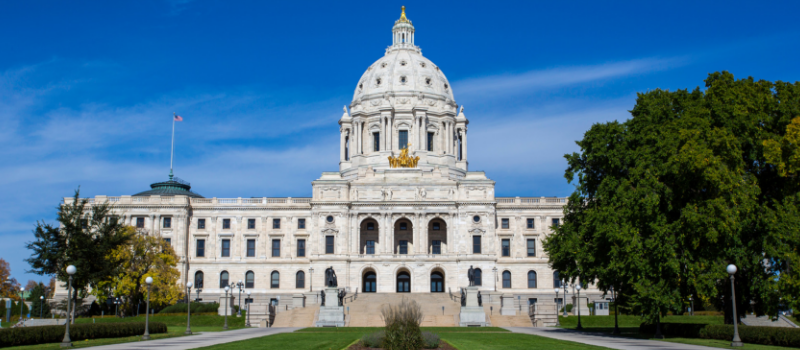2019 Legislative Session: What We’re Working on for MN Kids
By Josh Crosson
The 2019 state legislative session kicked off last Tuesday, and policymakers have already laid out some of their top policy proposals. With a new governor, a new commissioner of education, and lots of new faces in the Legislature, we expect to see different takes—and hopefully needed progress—on returning education priorities, alongside new proposals that will unfold over the next few weeks. In the meantime, I’m excited to share EdAllies’ top priorities for the 2019 session to advance our vision of a Minnesota where every student receives a rigorous and engaging education.
SCHOOL DISCIPLINE
Minnesota’s current approach to discipline is not working. Minnesota must invest in discipline strategies to keep students in school and engaged, using suspensions and expulsions as a last resort. During the 2019 session, we’ll work with the Solutions Not Suspensions coalition, as well as parents and students directly impacted by school pushout, to advocate for the Student Inclusion and Engagement Act. By improving transparency, accountability, and parent involvement around discipline, training educators on alternatives to school pushout, strengthening student due process, and much more, this legislation would take many important first steps to overhaul and improve how educators discipline students across Minnesota.
TEACHER LICENSURE
After years of debate, compromise, and rulemaking, Minnesota finally has a streamlined tiered teacher licensure system in place. As lawmakers consider policy tweaks, they must defend the spirit of this new system. Whether they come from out-of-state, non-traditional training programs, or school support roles, high-quality educators deserve a clear path to the classrooms that need them. During the 2019 session, we’ll work to make sure that experienced, effective teachers retain a path to a permanent Tier 3 license, regardless of whether they complete a Minnesota-based preparation program. We’ll also defend the right of schools to hire the best teachers, no matter their licensure tier, for their students.
SCHOOL PERFORMANCE TRANSPARENCY
Families want and deserve transparent information on how schools are serving kids. Whether to celebrate their school’s successes, advocate for changes or resources, or explore the best options for their children, they need a straightforward way to understand how local schools are doing. To make school performance more accessible, we’re advocating for investments in much-needed updates to the state’s school report card so families can quickly get information on what matters most to them, like academics, school climate, and more. We’re also asking state leaders to give families a quick, concise way to make sense of the data by creating an overall school rating system that incorporates multiple measures of school performance.
TEACHER PREPARATION
To diversify and strengthen the teacher pipeline, we must support unique pathways to the classroom, such as alternative certification, Grow-Your-Own, teacher residency, and other nonconventional programs. With initial funding set to run out, state leaders must re-invest in the Alternative Teacher Preparation Grant, thereby advancing programs that will champion truly innovative ways of preparing educators, recruit and retain highly effective teachers, and increase educator diversity.
MINNESOTA COMPREHENSIVE ASSESSMENTS
As our only statewide standards-based assessment, the MCA gives families, schools, and policymakers objective information on student proficiency and growth that they can’t get from any other tests like the ACT. To ensure this data is both accurate and actionable, we’ll push for commonsense tweaks to improve when schools administer the MCAs, and to speed up the reporting out of results to teachers and parents.
CHARTER SCHOOL QUALITY
Every family deserves to choose a high-quality school that meets their child’s needs. The state must ensure this is a meaningful choice by both removing barriers that restrict choice and holding all schools to high performance standards. To help charter schools—which are meant to have greater flexibility in exchange for stronger accountability—meet their full potential, we’re calling on state leaders to hold charters to high academic standards and support turnaround efforts at persistently struggling schools.
DATA DISAGGREGATION
In 2016, the Legislature passed a groundbreaking data disaggregation law, giving Minnesota the chance to lead the nation in understanding how schools serve students across race, ethnicity, and more. Policymakers must continue to champion data disaggregation as it rolls out statewide, and put the resulting data to work to target resources to the most underserved students.
EARLY LEARNING
Minnesota must provide adequate early learning funding from birth through kindergarten, prioritizing low-income families and empowering them to choose from a strong mixed delivery system. In 2019, we’ll join other early learning advocates in calling for continued investments in high-quality early learning, targeted first to low-income children, and for better state coordination across various early learning funding streams.
SPECIAL EDUCATION
Students with disabilities have been historically underserved in our education system, and underfunding at the state and federal level puts a significant strain on schools and districts. Calls to overhaul and increase special education have rightfully reached the Capitol. Now, as policymakers seek to address this issue, they must hold students harmless, regardless of whether they attend a district or charter school. Because charter schools cannot levy taxes nor access all sources of state funding, legislators must ensure that any change to the state’s special education bill back provision does not decrease charter schools’ funding and ultimately harm the students with disabilities that they serve.
WHAT YOU CAN DO
The EdAllies team will work hard to advance the interests of Minnesota’s students, especially students of color, students with disabilities, low-income learners, and other students from communities that have been historically underserved. As session picks up, we’ll need advocates like you ready to take action. Over the next few months, we’ll use social media and email to share opportunities to act on emerging policy proposals, so stay tuned!

